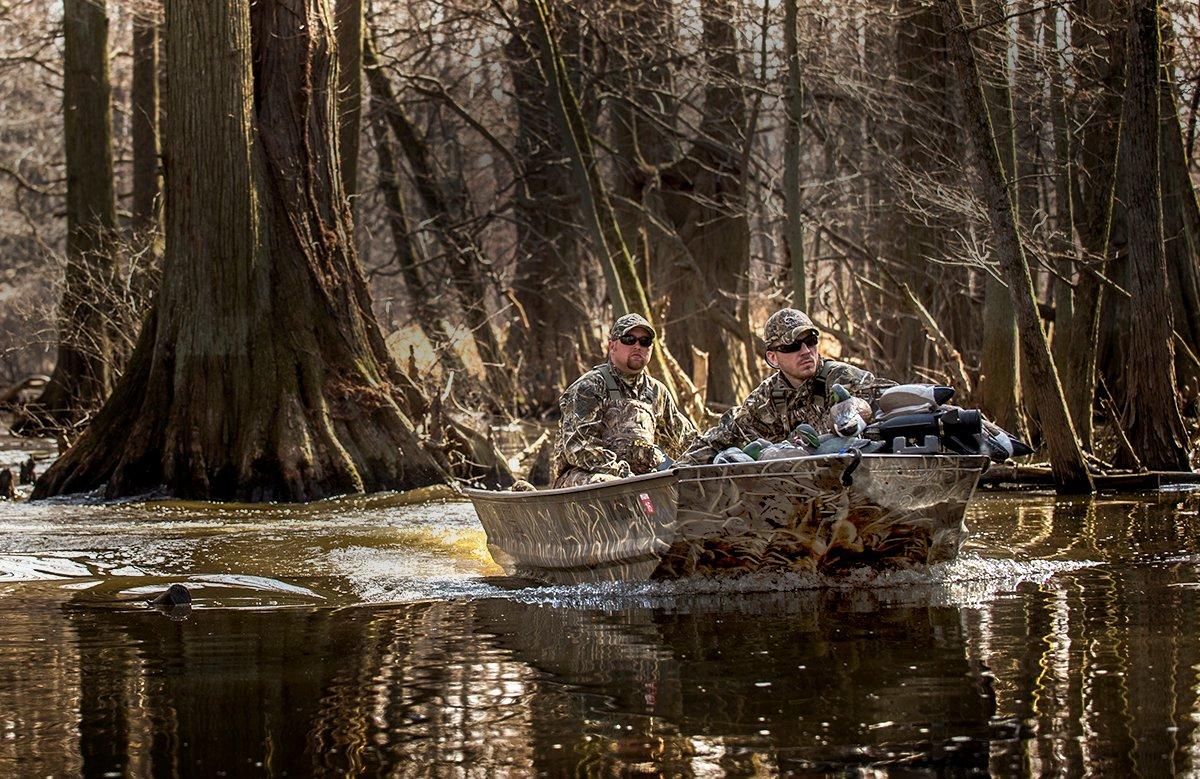Big or small, all duck boats must be safe and reliable
Duck boats vary almost as much as duck hunting situations, ranging from light shallow-draft rigs that can jump a beaver dam to hulking vessels that appear ready to cruise through icebergs at sea.
Obviously, one style or type of boat does not fit every situation. But if you've spent enough time on the water, you realize that good rigs share many qualities, regardless of the scenarios for which they're intended. Just ask America's top duck pros. They have firm ideas about the common features needed on every good duck boat.
The first thing I discovered about duck boats is there is not a perfect duck boat, said Jeremy Dersham, owner of Ridge and River Running Outfitters, who guides hunters on Pool 9 of the Mississippi River. The most influential things I'm looking at are safety and durability. I need my rig to have the ability to manage rough water, carry an abundance of gear and people, have the maneuverability to manage high and low water, and deal with the weight and treachery of ice safely through the season. I also need it to get me through a 60-day season without breaking down and costing me days off the water.
Chad Belding, host of The Fowl Life, agreed that safety is his No. 1 requirement in a boat, especially because duck hunters often run their crafts before or after dark, during bad weather, and in areas with potentially hazardous navigation.
Some of the important factors we look for are the security and balance of the vessels we're driving, he said. We want a boat that handles and maneuvers with ease and smoothness. Our boats are usually loaded down with gear, dogs, and hunting partners, and we always want to be sure the boat has the capability of staying balanced in the water.
Dersham said he pays special attention to the construction and configuration of a boat.
I'm looking at the gauge of the hull materials before making a purchase, he said. I need it to be strong enough to deal with rocks, ice, sand, and rough water — but be light enough to manhandle in low water. For the size, I'm looking for a rig wide enough to handle rough water, loads of gear, and lots of people — but again be small enough so I can manhandle it myself when needed. With the layout, I need to have the creature comforts of a small living area: heaters, room for coolers, wet dogs, and three to four hunters, yet stable enough to my clients aren't looking at the skylines versus the decoys on the water.
Cooper Olmstead of Habitat Flats prefers larger, wider boats that offer superior stability. Like Dersham, he also said a boat's internal layout plays a large role in safe, easy operation.
I have a permanent aluminum high-low blind on my boat with front steering, he said. With the front steering wheel, you have a lot more visibility, which is key in a marsh-type setting, especially in low light conditions. With this setup, you can get out of the elements and stay dry. In my boat, the heaters and a cook stove are mounted under the low side of the blind under two shelves. This helps keep the temperature very comfortable and also keeps all your gear stored in a safe, organized manner.
Belding and Olmstead said motors are critically important for duck boats, as underpowering a boat is a grave mistake. Typically, it's best to use a motor with the maximum horsepower rated for a craft. Further, the motor must be reliable and easy to operate, especially in low light or bad weather.
You want a motor that's notably powerful but is user friendly, Belding said. From acceleration and horsepower to the safety leash and emergency cutoff, we want all the bases covered, as we understand how precious our cargo is.
Finally, Dersham said he considers one more aspect before choosing a boat: simplicity.
It's not if something is going to break but rather when, he said. I need my rig to be as ignorance-proof as possible when it comes to mechanics. I do not want to have to have a PhD in mechanical engineering to fix my rig when things break down. I want my engine and electronics to be common enough so I can order parts without having to come from overseas, along with having extras of common materials, such as lights, bulbs, batteries, bilge pumps, plugs, hoses, water pumps, and gas lines. It doesn't hurt to have a great mechanic on speed dial, also. In the end, I have 60 days to run without significant hiccups. I need my rig to accommodate everything I throw at it in that time.
(Don't miss: Mud, MAX-7 and Louisiana Mayhem)
Click here for more Realtree waterfowl hunting content. And check us out on Facebook.








